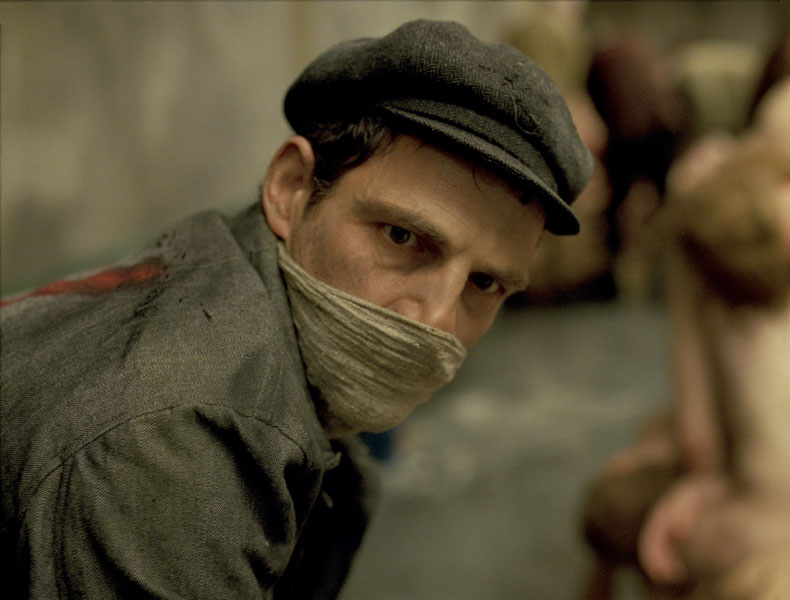
Son of Saul
2015, R, 107 min. Directed by László Nemes. Starring Géza Röhrig, Levente Molnar, Urs Rechn, Todd Charmont, Sándor Zsotér, Marcin Czarnik, Jerzy Walczak.
REVIEWED By Marc Savlov, Fri., Feb. 26, 2016
Every now and again you hear the argument simmering in the background whenever a new Holocaust-specific film is released: Haven’t there been enough already? Isn’t it possible that the Jewish command to “never forget” is somehow being diluted via so many films that either immerse the viewer in the horror (the television miniseries Holocaust, Schindler’s List) or touch on the Nazi atrocities tangentially (Orson Welles’ The Stranger, Sidney Lumet’s The Pawnbroker, Liliana Cavani’s The Night Porter). Wasn’t Claude Lanzmann’s Shoah the be-all and end-all of documentary nightmare remembrances? The truth is – and always has been – human beings have remarkably short memories. Telling people, especially generations removed from the Nazi war machine, to never forget is more often than not a losing proposition. We’re hard-wired to forget or consciously submerge the unspeakable; it’s a survival trait. Given the sheer scope and ongoing historical echoes of the Holocaust (the Rwandan genocide, the current refugee situation sweeping through Europe and the U.S.), not to mention the Holocaust’s inherently dramatic and almost incomprehensibly tragic aspects, it’s clear that reminders of what once happened are necessary, no matter how painful they might be.
So now we have the terrifyingly intimate Son of Saul, a film unlike any other Holocaust film you’ve ever seen. It’s not as graphic as many – there are more cordwood-piled corpses in Roberto Benigni’s Life Is Beautiful than are seen here – but Hungarian director László Nemes and actor Géza Röhrig, who plays the titular Saul and is in virtually every shot, employ a heart-shattering form of “you are there” filmic composition to put the audience dead center amidst the horrific, workaday world. We see everything from Saul’s POV as though we were standing or running right behind him, his shoulder or head always in frame in front of us. The effect is devastating, both emotionally and physically. You literally can’t take your eyes off Saul.
What’s more, he’s a member of the camp’s Sonderkommando, a group of Jews who were forced to act as Judas goats for the doomed new arrivals. Immediately off the trains, the “prisoners” are split up and promised “showers and bowls of hot soup” to follow; of course, there’s no soup, there’s only the Zyklon-B cannisters and muffled screams. Saul and his co-Kommandos are the ones tasked with cleaning out the gas chambers and the overflowing crematoria, going through the pockets of the dead in search of anything that might be of value to the Germans: eyeglasses, gold teeth, hair. It’s Saul’s bad fortune to witness a young boy who miraculously survives the gas. Although the youngster dies soon afterward, Saul gets it into his head that the boy is his son and sets out on his own secret mission to make sure the boy’s corpse is inhumed in a proper Jewish burial, rabbi and all. One of director Nemes’ best ideas in Son of Saul is never actually allowing the audience to know if the harried, grim Saul is actually the dead boy’s father. Is he delusional? Certainly that wouldn’t be out of the question given the circumstances. Burying the boy secretly, right beneath the all-seeing gaze of the camp’s overseers, gives Saul a tangible reason to live, if only just a little bit longer. (Sonderkommandos were routinely sent to the showers, or summarily executed, after a certain number of months, the better to keep a lid on any escape plans or anything else that could slow the awful work at hand.)
Röhrig, in his acting debut, is mesmerizing. His Saul labors with the grim determination of a man somehow seeking to expiate the sin of being a Sonderkommando. We learn little if anything about his life before, but the boy’s death and his commitment to honoring that nameless child is what gives him purpose while working in the nearest place to hell on Earth. Nemes pulls few punches – the story ends on a low note, as it tended to do in real life – but this is no concentration-camp exploitation picture. Instead, it’s a harrowing reminder of exactly why we must never forget.
A note to readers: Bold and uncensored, The Austin Chronicle has been Austin’s independent news source for over 40 years, expressing the community’s political and environmental concerns and supporting its active cultural scene. Now more than ever, we need your support to continue supplying Austin with independent, free press. If real news is important to you, please consider making a donation of $5, $10 or whatever you can afford, to help keep our journalism on stands.
Marjorie Baumgarten, April 26, 2019
Aug. 7, 2022
April 29, 2022
Son of Saul, László Nemes, Géza Röhrig, Levente Molnar, Urs Rechn, Todd Charmont, Sándor Zsotér, Marcin Czarnik, Jerzy Walczak








